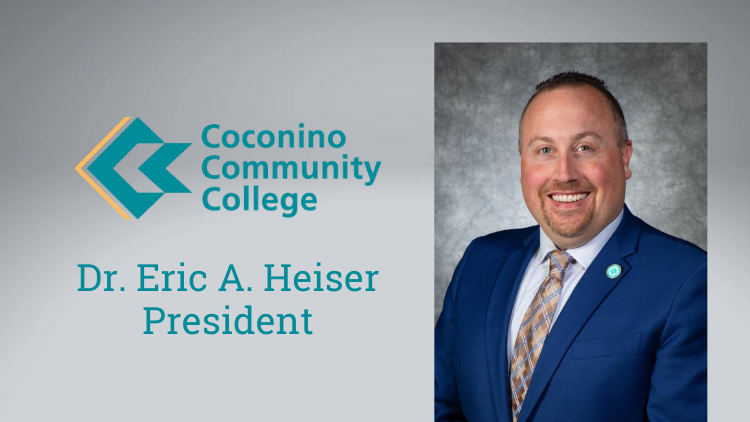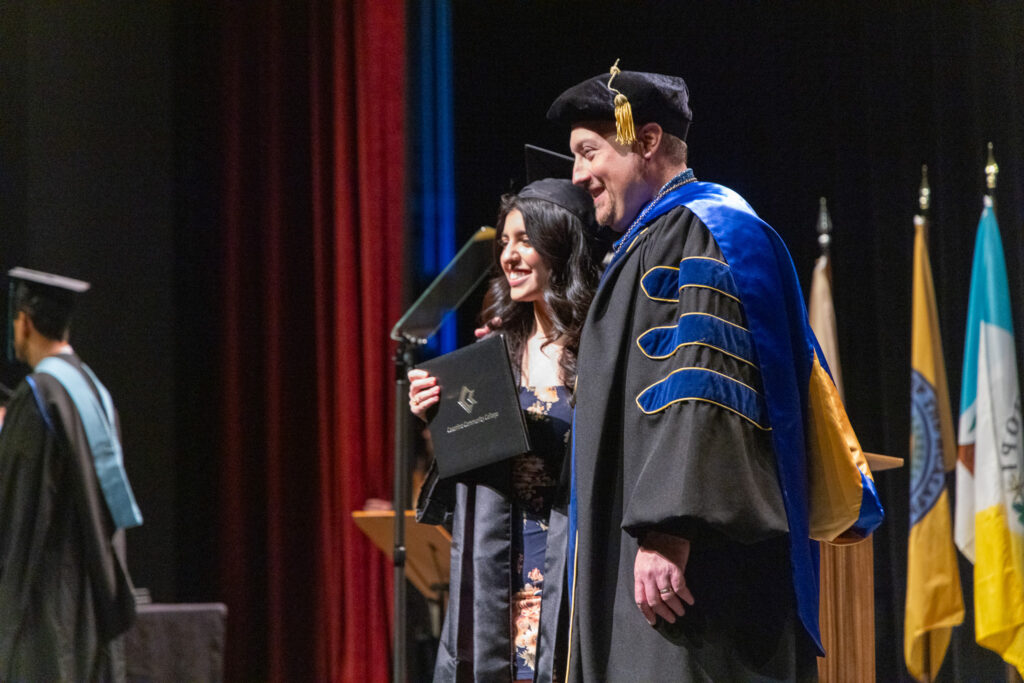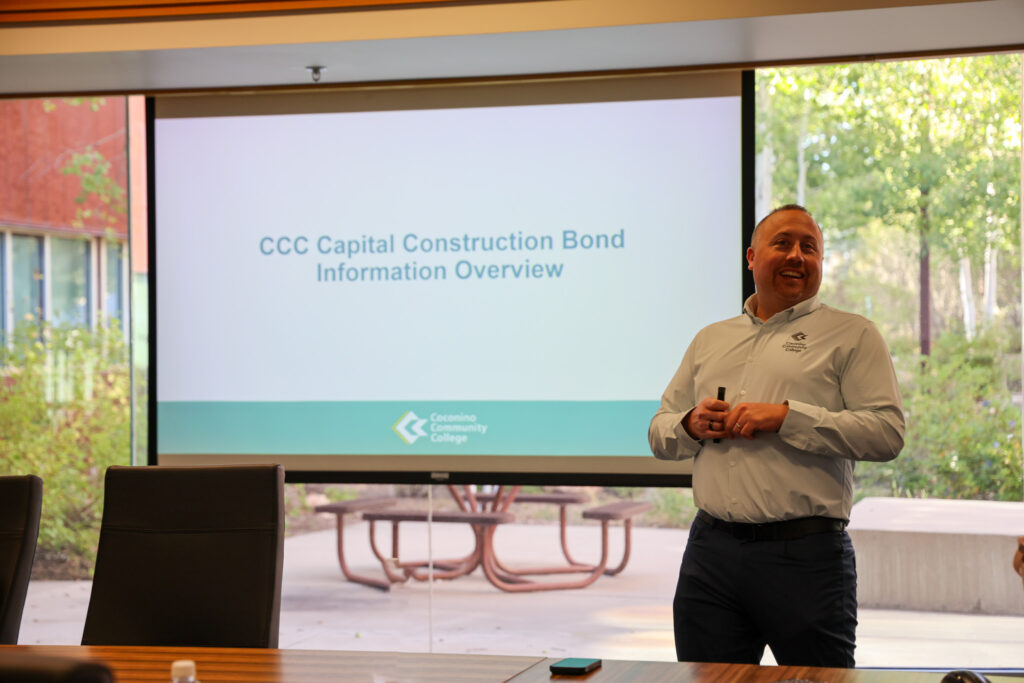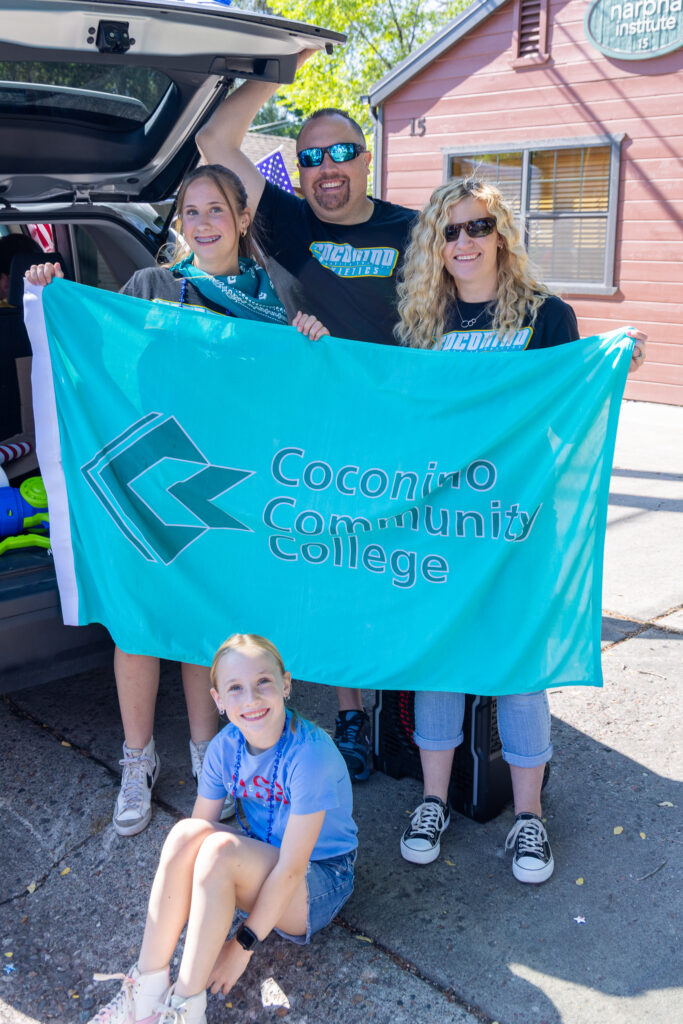
Dr. Eric Heiser has been an educator for more than 20 years, the past three as the President of Coconino Community College. We talked with him about growing up in Wyoming, the continued value of a college education, and the $100 million construction bond CCC has put on the ballot for November.
Q: Do you see parallels between where you were raised and northern Arizona?
A: I would say it is almost identical to what I experienced in Wyoming. I grew up on the Wind River Indian Reservation, which is split by two tribes, the Northern Arapahoe and the Eastern Shoshone. The first college I worked at out there was Central Wyoming College and we had a very high native American student population given our proximity to the reservation so, yes, lots of similarities. That was one of the things that drew me to this job was the familiarity of working in a college that had a high population of Native American students.
Q: How did you choose education as a career?
A: It was somewhat accidental. After I finished my bachelor’s degree in business, I got the crazy idea that I wanted to be in hospitality. So I ran a brand new hotel for about a year, and it took less than that time to decide I didn’t really want to be in hospitality. A former instructor of mine at CWC reached out to me and said she had a workforce training position that she thought would be a great fit for me. I got the job and fell in love with the classroom. So I went on to get my master’s degree and moved into a full-time faculty role.
The administrative side came from seeing that while the change that you affect in a classroom is phenomenal, it’s at scale. The ability to affect change at a higher level only comes with moving into administration.

Q: There are people who question whether earning a degree still matters. How do you respond to that?
A: Whenever someone says “college isn’t for everyone,” I cringe a little. First off, as a society, we desperately need the ability to learn how to think critically. We need to learn how to think for ourselves, to do research on our own, and not just be spoon-fed whatever the Internet says or whatever a best friend or a family member wants to tell us.
What you hear in the narrative from the national media about value propositions, it doesn’t really apply to community colleges, because the vast majority of our students graduate with little to no debt. We do everything we can to keep students from taking out any type of loan. And if we can get you through to your associates degree debt-free, we’re putting you on a better path, whether you choose to move into the workforce right after that or if you’re going on to earn your bachelor’s degree.
Q: What makes community colleges special?
A: In October, I’ll start my 21st year in higher ed. All 21 years will have been in community colleges. And what I’m about to say isn’t a slight to universities, but in some ways, our wins at community colleges are bigger. We are an open-access institution – we take the top 100% of all the students. We’re not just taking those who knew they were going to college, or whose parents had a trust fund. We have students who oftentimes do not think of themselves as college material, who didn’t do particularly well in high school. Then they get in, and you see that light go on.
You see every different type of individual from every different type of walk of life, and – this sounds clichéd, but I just don’t know another way to put it – they need someone to believe in them. And I think that’s where the community college really excels. I think the mission of a community college is to elevate everyone in the community who wants that chance.
Q: You’ve been President at Coconino Community College for almost three years. What’s the biggest surprise?
A: It’s not so much that CCC has been a surprise, but this is my first time as a president, and this job is unlike any other. Just the depth and breadth of the problems that have to be solved and end up on your desk. This is my fourth community college, and all community colleges deal with very similar issues, but in this position you are running from fire to fire. It changes your mindset. You go from thinking “I hope nothing goes wrong today” to “how will I fix what goes wrong today?”

Q: What’s the biggest accomplishment CCC has had during your tenure?
A: I mean hopefully, in November, we’ll be talking about a successful bond initiative. I think that has the power to single-handedly move this college into not only the next generation, but to become the workforce engine for Coconino County. So many great things can happen if we are successful.
In these first three years, however, one of our biggest successes has been our partnership with United Way and KinderCamp. It’s for students who don’t have much or any Pre-K experience so they get to experience what kindergarten is like during the month of June. We’re providing a “Teal Ticket” to KinderCamp participants so they can study at no cost at CCC when they graduate from high school. It gives us a chance to talk to pre-school parents and let them know that there’s a place for their children at CCC.
I think that’s where things have really shifted for me as I’ve looked back at my 21 years in higher ed. We used to just take for granted that students were going to come to us, and we would never really start talking to students until their junior or senior year. Now we’re starting before kindergarten!
We also started our summer camps through generous support from our donors for incoming 6th through 9th graders. It gives students six weeks to experience a community college. They get to pick and choose what they want to do. Often, it’s their first experience in a coding class or a culinary class. It’s just gone off like gangbusters – the first year we were near 300 campers and this year we were over 600 campers over the course of six weeks. Again, it’s about getting them on campus and letting them know there’s a place for them here. It’s going to take years for those efforts to pay dividends, but it will ultimately result in more students coming to CCC.
Q: How does CCC collaborate with local employers and ECoNA?
A: This is always a work in progress for us. I think I kind of alluded to what the second generation of CCC could be with the successful passage of the bond. But mostly what we’ve been doing is as simple as sitting down with businesses and asking them what they need. How can we make this better for you? How can we help you to better educate and train your employees? How can we make this college as valuable as we can for you?
I want employers to be able to reach out and say, “We have a problem. Can you help us solve it?” That’s what a community college should be known for. And that’s where I want to see us continue to grow.
Being active with economic development folks in northern Arizona is a big part of this as well, and obviously why it’s important to be part of ECoNA.

Q: You are currently meeting with community members to promote a $100 million bond initiative on the ballot this fall, which would allow CCC to rebuild its 4th Street Campus and add a dedicated Health Education building to the Lone Tree campus. But CCC is also asking for funds for student housing for your Page campus and to upgrade labs at Williams High School. What’s the thinking behind these items?
A: Many of our Page students drive multiple hours to the campus and then multiple hours home. If we can have housing there for them it is safer because they don’t have to be on the road so much, but it also gives us a much better chance of retaining those students and having them complete their studies. Their outcomes will greatly improve.
In Williams, if we can retrofit or build new career and technical education labs at the high school and deliver college-level courses, it’s a double bang for your buck. The school gets new labs, but we can expand opportunity and access to college level curriculum without their having to come to Flagstaff. We can keep it local for them, and we feel like that’ll be a big win for the citizens of Williams.
Q: Northern Arizona has seen workforce shortages in two sectors that are important to the region – healthcare and advanced manufacturing. How would approval of the bond measure help with this?
A: If this bond passes, by the time the health building opens, we will have nearly quadrupled the size of our nursing program in the past five years. And still, that’s not enough. There’s way more demand than there is supply. But the bond would also allow us to add three new programs for surgical techs, radiology techs, and respiratory therapists. Those are huge demand areas for Northern Arizona Healthcare and other health providers. And those are good paying jobs – surgical techs and radiology techs earn between $60,000 and $80,000 a year. Respiratory therapists can make over $100,000 a year.
They are what we call “H3” careers – high skill, high wage, and high demand. Those are the careers that we want to be training our students in. The health building will also house our EMT paramedic program and our fire science program, so it will be the base for public safety careers.
On the advanced manufacturing side, that would be part of the 4th Street building, adding space to the programs we already have like construction management, and nearly tripling the size of the lab space. That will let us do more training in advanced manufacturing that we’re not currently able to offer and set us up to really be able to serve our manufacturing consumers and our workforce partners.
Q: You’ll be teaching in the Community College Leadership program this fall at Northern Arizona University for students earning a Doctor of Education (EdD) degree. What are you going to share with them?
A: When I was a student, the director of my PhD program told us on our first day that we better pick something that we loved for our dissertation, because we were going to have to live with it for a long time. I feel like it’s the same way for higher ed. You better at least have an inkling that this is going to be something you love from a mission standpoint and a purpose standpoint. You’re not going to get rich. Don’t get me wrong, you can make a fine living in higher education, but it really has to be about that greater good and seeing people succeed. It’s about seeing a student who’s the first in their family to graduate from college cross that stage for their diploma. If that charges you up, if that gets you out of bed in the morning, then I think there’s definitely a place for you in higher ed.
Q: What advice would you give all students entering the workforce today?
A: Don’t be afraid of change. I think that with the speed and the rate of change and given where our technology is heading, you better get real comfortable with the uncomfortable. Because the idea that you’re just going to have a job that you mindlessly check into in the morning and mindlessly check out of in the afternoon? Those days are gone.
But I’m not of the opinion that robots and computers are going to take over the world or that AI is the worst thing ever. On the contrary, those who know how to use that technology and can use it to their advantage will become much more valuable to their employers. They’ll be much more efficient in the way that they’re able to get their jobs done. We’re already seeing it.
Q: What practices help you maintain perspective and avoid burnout?
A: I think that centering on why you do what you do helps. I’ll take myself back to certain commencements and the looks on the students’ faces, the cheers you hear from the crowd when their name is called. Or having a student say you impacted their life for the better. If I’m feeling burned out, I go back to those student stories – and they are plentiful.

Q: What are your off hours like? Any hobbies you love, places you enjoy going to in northern Arizona?
A: I’m the father to two wonderful daughters and a husband to a wife I don’t deserve. I love spending time with my family. I love to cook, I’m a weekend pit master, so I do a lot of barbecue. I like being active – sports and hiking. My daughter and I were up at Agassiz Peak last weekend at Snowball. Family is super important to me and keeps me grounded.
And when my wife and I can have a date night, we go to Josephine’s and Atria. We don’t get out a ton, but when we do, those are our go-to spots.


Leave a Reply